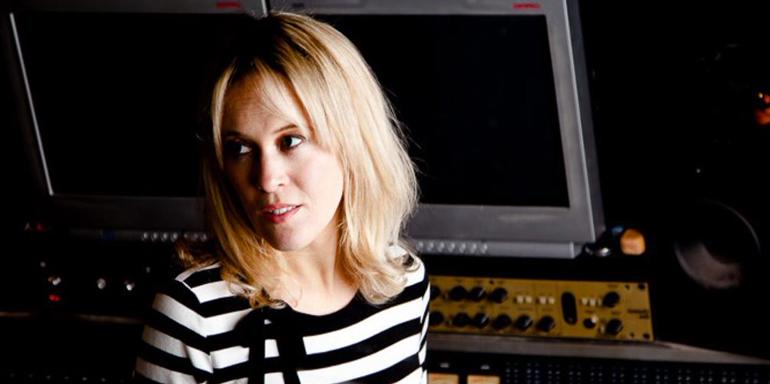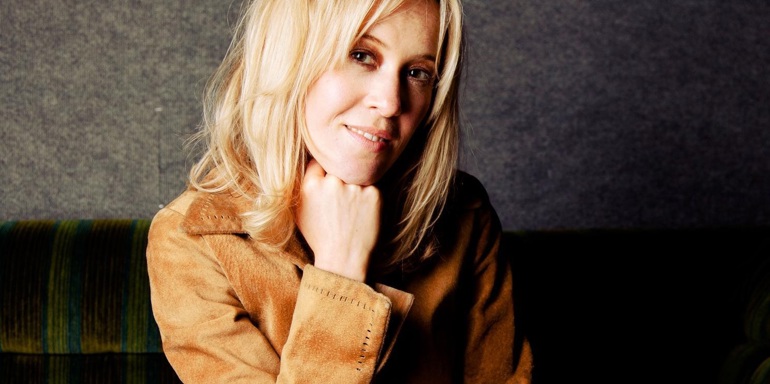Julie Thompson is a professional vocal coach, singer and songwriter. Her career took her to Germany through a chance meeting with a Frankfurt producer in a London studio, and led to her signing her first record deal and launching her career in Germany. After living and working in Germany for 11 years, Julie returned to the UK in 2016 and began her time as a Senior Lecturer at Leeds Conservatoire. Since then, Julie has performed all over Europe with numerous bands.

What are your musical beginnings?
I feel like music has always been a huge part of my life as I started playing the guitar when I was 8 years old. My music teacher never allowed me to take part in the school plays as she wanted me to be a part of the music production, either singing or playing in the orchestra, as I played multiple instruments back then. I guess I took music more seriously as a teenager and initially rebelled going to University as I just wanted to be in a band and write songs.
There was quite a lively music scene in the small town Rugby where I grew up and so I was inspired by all the bands that were playing weekly and started to write my own songs and hang out with the musicians that were getting the most attention. The journey really started at 18 yrs old when an older musician, a member of a sixties band The Searchers’ heard me perform, felt I had potential and began to mentor me. I recorded a number of demos with him in his studio and he sent me out on the gig circuit to hone my craft and gain performance experience; he was convinced I should work in the country genre. However, after playing a few theatres and clubs I didn’t feel that was for me at that time. The next break, for want of a better word, was when I met a German producer in London after my studies, who was auditioning for a native English speaking singer songwriter to manage. We clicked and I then began my career over there. A few years later, still in Germany, I fell into teaching through a friend who was looking for a pop singing teacher for their pop music school and I developed a second passion for vocal coaching.
What have been your greatest achievements so far?
I think I would class the relocation to Germany as one of my biggest achievement as this jump into another musical culture opened so many doors for me and it gave so much experience of what it is like to be an artist and a professional musician. I played some great festivals and radio tours, rubbing shoulders with many established artists in Germany whilst the label took care of all the organisational and logistical issues for me so it was quite a luxury. On paper I reached number 2 in the US & UK club charts.
Teaching at a German University was also a big achievement for me as my colleague and I were developing the pop voice department and introducing new perspectives and techniques into the system which was not always easy in a foreign language!
I would also class completing my 3 year training as singer and vocal coach in Copenhagen at The Complete Vocal Institute as a milestone, as that also connected me to a global community of singers and vocal coaches which I still keep in contact with, and some are featured on my new podcast!
Your new podcast, ‘The Connected Singer’ sounds brilliant! What’s the idea behind the show and why did you decide to create this?
The idea came from discussion I was having with fellow vocal coach/friend Michael Hill, about how lonely it can feel to be a popular music artist or the singer of a band whilst experiencing health issues both mentally and physically. There is a lot of pressure to be constantly at the top of your game whether you are just starting out or have been working in the business for years. Although experience can perhaps teach you where your boundaries are, you are never quite sure when it is safe to push these boundaries or to trust your body’s signals and stop before it causes long term damage. Those you work with will often not tell you when to stop and others you compare yourself to appear to be achieving the impossible without a complaint, i.e., handling a gruelling schedule, fronting a project with an abundance of confidence, maintaining a perfect voice with what seems to be raw, natural talent. It was only when sharing my experiences, as a singer and artist that has had stress related vocal issues, and coaching new up and coming artists/singers, that I realised that there are still many suffering in silence, from the pressures that come with being a singer. We therefore felt it was time to provide a platform where these issues can be discussed openly and honestly by specialists, singers and musicians alike. We felt sharing this knowledge and experience will create an awareness that we are all experiencing the same concerns and can learn and support one another. We use the word “connection” for two reasons; to signify the mind and body connection that we need to have in order to maintain our vocal and mental health; and to connect singers and specialist together. Ultimately we would love to create a community space where artists and singers can support one another and specialists can offer advice as this seems to be lacking currently.
You’ve had some great guests on so far – as a musician yourself, who did you feel you learned the most from?
That is quite a difficult question to answer as I think every guest so far has brought a special and unique insight, not only into how to deal with the challenges of working in the music industry but have also shared quite intimate experiences that are inspiring in helping us to navigate through life in general; I think this will be particularly helpful during the challenging times we are currently living through. I think all listeners will find something within all of the interviews that will resonate with them on some level; just to know that others are experiencing similar struggles and to hear how they overcome them can feel like support itself and can be very inspiring.

You’ve discussed many aspects of the music industry throughout the series – what can musicians expect to learn by listening to the podcast?
Guests have been invited to talk fundamentally about their specialism in relation to the voice but we are finding that the tools and knowledge that is being shared can be related to all musicians and performers, even perhaps to those in non-music related careers but require some form of public speaking tips or want inspiration to kick start their creativity. We also cover topics that can be applied to many other aspects in life as every role we play is connected and they influence each other. Tuning in to our intuition and deliberate practice are also interesting topics.
What do you hope to cover in future episodes? Any dream guests that you’d like to interview in the future?
Our aim is to offer support that resonates with all singers and artists, therefore we are hoping to create many episodes containing as much variety and diversity as possible. There are so many inspirational creatives we would love to invite, but our goal is to interview a mixture of singers from different genres and development coaches, as well as those working in other creative industries. We hope this will offer fresh perspectives on sensitive issues such as performance anxiety, which has become a running theme through the current series, or share advice on being in the ‘flow’ and how to maintain this. We are always on the lookout for people who share that vision and are willing to share their knowledge and wisdom. Therefore if anyone listening has any ideas or connections to such people that think they would be interested in being a guest then please get in touch by messaging us on our Facebook page.
What advice would you give to young people wanting to form a career in the Music Industry?
Connecting with other musicians and finding an environment where there is an active musical community, as collaboration is very important, not only to gain significant musical skills but to widen your network, help your music reach more people and help keep you in the flow of your creations. You need to be highly motivated and develop entrepreneur skills these days to maintain a career in this business, therefore leaning on others for motivation and inspiration from time to time will keep you focused. It is also important to find like-minded musicians who have the same goals and work ethic as you - it is worth trying to establish this from the onset if possible.
I also believe experience is key. I have always tried to push myself out of my comfort zone - jump in the deep end with my eyes closed and see how I swim up to the surface. That is often how more opportunities come along and you can learn so much from every experience however big or small, therefore I would say play play play!
Remaining flexible, open, honest, friendly and respectful to those you work with is very important. You often only get one chance at most opportunities and although an authentic colourful character is welcomed, no one has time for those being difficult and unreliable, and the business is too competitive for that. Having a few strings to your bow allows you to naturally be more flexible and a greater asset to a project e.g if you sing consider learning an instrument or vice versa, perhaps even be able to play a second instrument; explore your unique strengths as these may just be what opens up few more doors to work and exciting projects.
Remember why you began music in the first place and if you have a strong vision then follow it whilst trusting your instinct. If you remain authentic to yourself, you will not only be more confident and convinced of your ideas and direction but be convincing others in and beyond the industry too. The work and moments of success can come in phases so it is important to try and keep being consistent in your work ethic and development. Those that maintain a healthy long-lasting career in music have often created routines and an environment that helps inspire them and encourage them to keep in a creativity flow.
Listen to The Connected Singer on Spotify or Apple Podcasts
Follow The Connected Singer on Facebook
Find out more about Julie by reading her Tutor Profile
Find out about our BA (Hons) Music (Popular) programme







